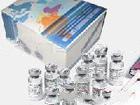Beta defensins are a family of mammalian defensins. The beta defensins are antimicrobial peptides implicated in the resistance of epithelial surfaces to microbial colonization.
Defensins are 2-6 kDa, cationic, microbicidal peptides active against many Gram-negative and Gram-positive bacteria, fungi, and enveloped viruses, containing three pairs of intramolecular disulfide bonds. On the basis of their size and pattern of disulfide bonding, mammalian defensins are classified into alpha, beta and theta categories. Every mammalian species explored thus far has beta-defensins. In cows, as many as 13 beta-defensins exist in neutrophils. However, in other species, beta-defensins are more often produced by epithelial cells lining various organs (e.g. the epidermis, bronchial tree and genitourinary tract.
b-Defensin-1 is one of a family of small cationic peptides with the ability to disrupt cell membranes, resulting in antimicrobial and possibly anti-tumour activity. The protein is expressed in the distal nephron. The gene, along with those of the other members of the family of defensin, is at 8p23 and is deleted in conventional renal cell carcinoma.
More about: b-Defensin-1, human sale
Read more: Polypeptides

No comments:
Post a Comment